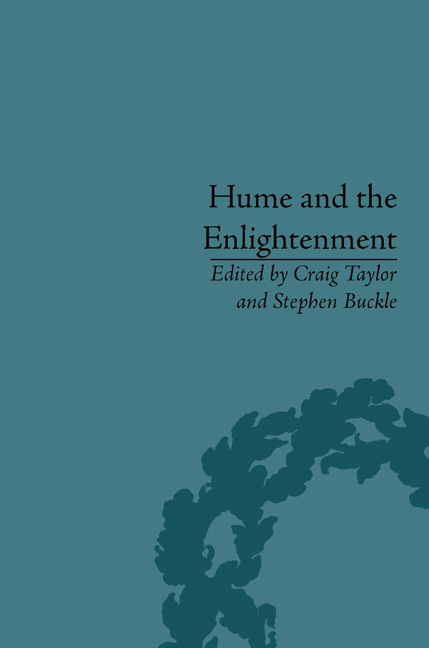Book contents
- Frontmatter
- CONTENTS
- Acknowledgements
- List of Contributors
- Abbreviations
- Introduction: Hume and his Intellectual Legacy
- 1 Hume and the Enlightenment
- 2 Will the Real Enlightenment Historian Please Stand Up? Catharine Macaulay versus David Hume
- 3 Philosophy, Historiography and the Enlightenment: A Response to Green
- 4 Hume's Enlightenment Aesthetics and Philosophy of Mathematics
- 5 Part 9 of Hume's Dialogues and ‘The Accurate Philosophical Turn of Cleanthes
- 6 ‘Strange Lengths’: Hume and Satire in the Dialogues Concerning Natural Religion
- 7 A Modern Malignant Demon? Hume's Scepticism with regard to Reason (Partly) Vindicated
- 8 Hume on Sympathy and Cruelty
- 9 Hume's Natural History of Justice
- 10 Hume and Rawls on the Stability of a Society's System of Justice
- 11 Can Hume's Impressions of Reflection Represent?
- 12 Mechanism and Thought Formation: Hume's Emancipatory Scepticism
- Notes
- Works Cited
- Index
12 - Mechanism and Thought Formation: Hume's Emancipatory Scepticism
- Frontmatter
- CONTENTS
- Acknowledgements
- List of Contributors
- Abbreviations
- Introduction: Hume and his Intellectual Legacy
- 1 Hume and the Enlightenment
- 2 Will the Real Enlightenment Historian Please Stand Up? Catharine Macaulay versus David Hume
- 3 Philosophy, Historiography and the Enlightenment: A Response to Green
- 4 Hume's Enlightenment Aesthetics and Philosophy of Mathematics
- 5 Part 9 of Hume's Dialogues and ‘The Accurate Philosophical Turn of Cleanthes
- 6 ‘Strange Lengths’: Hume and Satire in the Dialogues Concerning Natural Religion
- 7 A Modern Malignant Demon? Hume's Scepticism with regard to Reason (Partly) Vindicated
- 8 Hume on Sympathy and Cruelty
- 9 Hume's Natural History of Justice
- 10 Hume and Rawls on the Stability of a Society's System of Justice
- 11 Can Hume's Impressions of Reflection Represent?
- 12 Mechanism and Thought Formation: Hume's Emancipatory Scepticism
- Notes
- Works Cited
- Index
Summary
Introduction
Hume frequently denies that we can know the causes of our impressions; however, he urges us to clarify the value of our ideas by tracing them to the impressions from which they derive. The question that arises here is why valuable ideas should be based on impressions at all. If impressions cannot be known correctly to mirror the properties of the objects that act as their causes, it seems that we have no good reason to trust impression-derived ideas more than any other ideas; for all we can tell, they may or may not tell us something about the way the world is. Furthermore, if ideas are required to resemble our impressions, as Hume's copy principle seems to suggest, the world of which we conceive by entertaining legitimately formed ideas will resemble the world of our sensations, although, as Reid has famously claimed, it is highly implausible to depict the world in this manner:
In all this debate about the existence of a material world, it hath been taken for granted on both sides, that this same material world, if such there be, must be the express image of our sensations: that we can have no conception of any material thing which is not like some sensation in our mind; and particularly, that the sensations of touch are images of extension, hardness, figure and motion.
- Type
- Chapter
- Information
- Hume and the Enlightenment , pp. 171 - 186Publisher: Pickering & ChattoFirst published in: 2014



